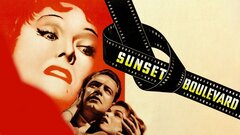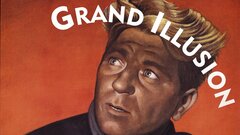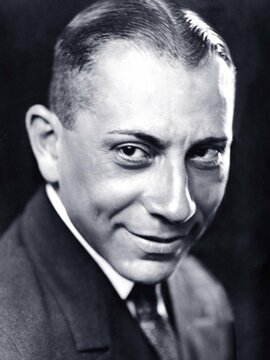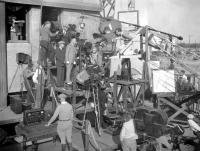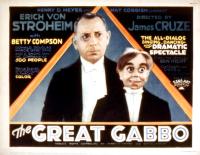Costumed in tailored military uniforms accessorized with gleaming medals, Austrian émigré Erich von Stroheim became known to American filmgoers during the silent era for his icy portrayals of pre-World War II German soldiers. Arriving in Hollywood in 1914, von Stroheim gained entry into the film industry as a technical advisor and horseman. Later an assistant for D. W. Griffith, von Stroheim brokered a deal, agreeing to work for free for the chance to direct his first film. "Blind Husbands" (1919) was a hit despite von Stroheim's insistence on expensive location photography. His budgets would ultimately cost him control of his films, with his nine-hour "Greed" (1924) reduced to two and "The Wedding March" (1928) shut down after nine months. Fired by star Gloria Swanson during the shooting of "Queen Kelly" (1929), von Stroheim was considered unemployable as a director and returned to the life of a jobbing actor. Using his sinister mien to good effect in such quickies as "The Crime of Dr. Crespi" (1935) and "The Great Flamarion" (1945), von Stroheim contributed vivid supporting performances to Billy Wilder's "Five Graves to Cairo" (1943) and "Sunset Blvd." (1950), the latter reuniting him with Swanson for an acidic meditation of the dark side of the silver screen. Cancer took his life in May 1957, robbing moviegoers of one of its most unique visionaries and an unforgettable film presence.
Erich Oswald Stroheim was born on Sept. 22, 1885, in Vienna, Austria. His parents were middle-class Jews who ran a millinery in Vienna's 7th District and expected their first-born son to assume control of the family business. Uninterested in school work, Stroheim was sent to a trade school in Graz to prepare him for a business career, but that too ended in failure due to frequent truancy. In the fall of 1906, in a bid to escape his destiny as a merchant, Stroheim enlisted as a volunteer with a military transport regiment, where he was trained to handle horses and wagons. Declared unfit for active duty due to physical weakness, Stroheim was discharged in April 1907 and returned to Vienna. Due to a hunting accident, in which Stroheim's younger brother Bruno killed a friend, a portion of the Stroheim savings was put towards arbitration to keep the affair out of court. The family business was liquidated in 1913, but Stroheim had long since left Austria for the promise of a new life in America.
Stroheim sailed from Bremen to New York aboard the S. S. Fredrich Wilhelm, arriving at Ellis Island in November 1909. At his customs interrogation, and despite speaking with a distinct lower-class accent, the 24-year-old émigré identified himself as Count Erich Oswald Hans Carl Maria Stroheim von Nordenwall, the descendant of an aristocratic Prussian family. The makeover would be characteristic of the newly-minted Erich von Stroheim's frequent autobiographical fabrications, which erased his past in favor of a hagiography of titled affluence and military distinction. Due to his limited command of English, von Stroheim's first job in America was wrapping gifts at a Manhattan department store during the Christmas season. In 1911, he enlisted as a private in the New York National Guard, serving only a few months before disappearing from the ranks. Work with a garment company brought von Stroheim to San Francisco in 1912.
In 1914, von Stroheim arrived in Hollywood on the heels of a short-lived but educational marriage to the daughter of an affluent Bay Area physician. His experience with horses in Austria and with the New York National Guard allowed him to secure a position with a riding academy in Pasadena. Work within the film community was not immediately forthcoming, but the new arrival managed to cobble together some experience with director D.W. Griffith. In the 1940s, von Stroheim claimed to have worked as an extra on Griffith's "Birth of a Nation" (1915); whether this credit was genuine or another of his colorful inventions, von Stroheim did appear in bit parts in several productions of Griffith's Fine Arts Studio. By 1917, he had graduated to principal roles, playing Prussian officers in Alan Crosland's "The Unbeliever" (1918) and Chester Withey's "The Hun Within" (1918).
Von Stroheim's work behind the scenes in Hollywood, as a technical advisor on issues of military detail, led to assignments as an assistant director. In 1919, he made his directorial debut with "Blind Husbands" and starred as an Austrian soldier who woos the feckless wife of a vacationing surgeon. In order to persuade the Universal Film Manufacturing Company to allow him the privilege of filming his own screenplay, von Stroheim agreed to direct, design sets, and edit the film for free, while retaining only an actor's salary of $200 a week. By this time, von Stroheim had cemented his cinematic mien to his fabricated backstory, forging for the moviegoing public a reputation as "The Man You Love to Hate," both in front of and behind the camera, epitomizing a presumed quintessential Hun for a nation staggering victorious but scarred from the First World War.
Though von Stroheim would be remembered as one of the preeminent writer-directors of Hollywood's silent epoch, he made only seven films. Soaring costs related to his insistence on location shooting and a high level of realism eventually cost the auteur control of his projects. "Greed" (1924), von Stroheim's adaptation of the Frank Norris novel McTeague and the first feature produced by Metro-Goldwyn-Mayer, ran nine hours before the studio cut it down to slightly over two. "The Wedding March" (1928), in which von Stroheim starred as a militarist in love with commoner Fay Wray, went over-budget and over-schedule, compelling Paramount to pull the plug and release the footage as two feature films. In 1928, silent film star Gloria Swanson tapped von Stroheim to direct her in "Queen Kelly" but fired him mid-production, bringing in other directors to complete the film for European distribution.
Von Stroheim's one attempt at a talking picture, "Walking Down Broadway" (1932), was withheld from distribution by Fox, who had the material reshot by Alfred Werker, Alan Crosland and Raoul Walsh before releasing the result as "Hello, Sister!" (1933). Having weathered two more unsuccessful marriages, productive of two sons from different mothers, von Stroheim abandoned filmmaking to return to the life of a jobbing actor. His reputation as a backlot tyrant began to inform his film roles. He played a maniacal film director in "The Lost Squadron" (1932) and a mad scientist in "The Crime of Dr. Crespi" (1935). Abandoning his sons, he sailed to Europe to play the crippled commandant of a German concentration camp in Jean Renoir's classic anti-war film "Grand Illusion" (1937). Returning to the States, von Stroheim broke a creative dry spell by replacing Boris Karloff in the original Broadway production of "Arsenic and Old Lace," staying with the show for a year and a half.
For Billy Wilder, von Stroheim appeared as real life German Field Marshall Erwin Rommel in Billy Wilder's otherwise fictional "Five Graves to Cairo" (1943). Less reputable was his stoic turn as another mad doctor in "The Lady and the Monster" (1945), produced by the Poverty Row outfit Republic Pictures. Also for Republic, von Stroheim appeared in "Flame Over Lisbon" (1944) - a cheap attempt to cash in on the success of "Casablanca" (1942) - and "The Great Flamarion" (1945), in which he played a vaudeville trick shooter gulled into committing murder. For the equally frugal independent Producer's Releasing Corporation, von Stroheim starred in "The Mask of Dijon" (1945), as an embittered hypnotist who mesmerizes others into doing his dirty deeds. Unable to find work with the major studios, von Stroheim settled for a time in France.
Von Stroheim's acting career might have ended in the ignominy of Poverty Row paychecks were it not for the intervention of countryman Billy Wilder. Lured back to Hollywood with the promise of work in a major film, von Stroheim reluctantly accepted the role of Max Mayerling, butler and chauffeur to faded film star Gloria Swanson in "Sunset Blvd." (1951). Though Wilder's acidic meditation on the dark side of the Hollywood dream cut uncomfortably close to the bone, it was von Stroheim who suggested that footage from "Queen Kelly," the feature from which Swanson had once had him fired, be used in the film. Revealed ultimately as more than a mere valet - in fact, the ex-husband and one-time director of Swanson's mildewed Nora Desmond - Max proved to be von Stroheim's most tragically romantic character and netted him Oscar and Golden Globe nominations. Though he was often dismissive of his participation in "Sunset Blvd.," his role in it remained the jewel in his acting crown.
Diagnosed with prostate cancer in 1944 and treated with chemotherapy, von Stroheim suffered from declining health through the rest of his life. He continued to act in Europe, appearing as an overreaching scientist in Arthur Maria Rabenalt's remake of the German silent "Alraune" (1952) and bewigged as Ludwig von Beethoven in Sacha Guitry's "Napoleon" (1955), while writing screenplays that went unproduced. In 1957, von Stroheim's cancer metastasized to his spine, crippling him and confining him to his bed. That March, he accepted the French Legion of Honor, one true medal to hang with the costume jewelry and prop department ribbons he had long claimed represented evidence of his former military glory. Heavily sedated for pain in his final months and unable to leave his chateau in the Paris suburb of Maurepas, von Stroheim died in his sleep on May 12, 1957.
By Richard Harland Smith







